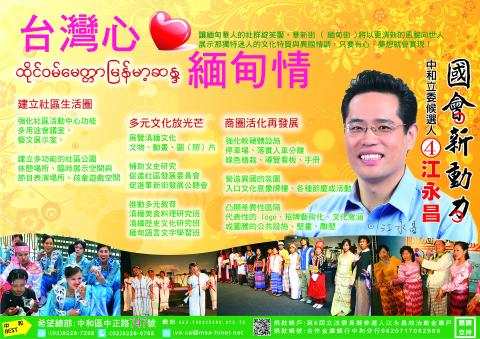The Nanshijiao area in New Taipei City’s Zhonghe District has the largest ethnic Chinese population from Myanmar in the entire country wtih a population of 50,000 people. In order to solicit votes from immigrants, the Chinese Nationalist Party’s (KMT) legislative candidate in New Taipei City’s eighth district (Zhonghe District), Chang Ching-chung, has made Burmese-language flyers, Democratic Progressive Party (DPP) candidate Chiang Yung-chang came up with “Taiwan hearts, Myanmar sentiments” flyers, and independent candidate Chiu Pei-ling has been busy walking around Huaxin Street, also known as Myanmar Street, soliciting votes.
Chao Li-ping, president of the Burma Overseas Chinese Association, said there are over 100,000 ethnically Chinese Burmese in Taiwan, 50,000 of whom are concentrated around the Nanshijiao area in New Taipei City’s Zhonghe District. It has the largest ethnically Chinese Burmese population in Taiwan, with around 30,000 of them having the right to vote.
Chang Ching-chung found a 30-year-old ethnically Chinese Burmese named Yang Chung-ching, who graduated from National Taiwan Normal University’s Graduate Institute for Teaching Chinese as a Second Language, specifically to help translate and proofread the flyers. The 3,000 flyers printed for the first batch have already all been dispensed and they are in the process of printing more.

Photo: Pan Hsing-Hui, Taipei Times
照片:自由時報記者潘杏惠
Chiang Yung-chang is also specifically targeting ethnically Chinese Burmese with his “Taiwan hearts, Myanmar sentiments” flyer. The flyer lays out his plan for promoting the cultures of Yunnan Province in China and Myanmar, which includes not only establishing a living area in the community, but also livening up the business area of Huaxin Street in order to show those living outside the area how unique and enticing the cultural characteristics and exotic flavor is there.
(LIBERTY TIMES, TRANSLATED BY KYLE JEFFCOAT)
新北市中和區南勢角一帶,是全國緬甸華人居住最多的地區,有五萬人口,為搶攻新住民票源,第八選區(中和)國民黨立委候選人張慶忠推出緬甸文文宣,民進黨江永昌也祭出「台灣心.緬甸情」文宣,無黨籍立委候選人邱珮琳則勤走有緬甸街之稱的華新街拜票。
中華民國緬甸歸僑協會理事長趙麗屏說,全台有十多萬的緬甸華人,其中五萬人集中在新北市中和區南勢角一帶,是人數最多的,可投票的選舉人數約有三萬人。

Photo: pan Hsing-hui, Taipei Times
照片:自由時報記者潘杏惠
張慶忠特別找來三十歲、台師大華語文教學研究所畢業的緬甸華人楊仲青進行緬甸文文宣的翻譯與校對,首波三千份發行就索取一空,已追加印製。
江永昌也特別針對緬甸華人,推出「台灣心.緬甸情」文宣,內容中提出他對推廣滇緬文化特色藍圖願景,除了建立社區生活圈,也要活化華新街商圈再發展,向外界展現獨特迷人的文化特質與異國情調。
(自由時報記者潘杏惠)

★ Bilingual Story is a fictionalized account. 雙語故事部分內容純屬虛構。 “Get in. It’s pouring.” She slid into the back seat, drenched and silent. “Tissues?” the driver asked. “No, thank you,” she said. Water beaded off her hair, ran from her coat, and made a small lake on the vinyl. She kept her head down, long black strands clinging to her face. “Where to?” She gave an address. “Funeral?” he asked as they slipped into the Xinhai Tunnel, rain fading to a hollow drum. She glanced up, puzzled. “No. Why?” “Crematorium’s about the only thing here.” He caught her eyes in the mirror.

Have you ever dreamed of hiking Taiwan’s majestic Mt. Jade or visiting Peru’s breathtaking Machu Picchu? These adventures sound amazing, but there’s something you should know about first: “altitude sickness.” This condition strikes when you climb to a higher elevation too quickly. The higher you go, the thinner the air becomes, making it harder for your body to absorb oxygen. The symptoms usually begin within hours of reaching high altitudes — about 2,500 meters or higher. You might experience headaches, dizziness, nausea, shortness of breath, or extreme fatigue. These symptoms can last for several days. The severity of altitude sickness varies

A: Any fun events happening this weekend? B: Boyband Energy’s concerts and Taiwan’s first major male dance revue have both sparked anticipation recently. A: Energy staged a comeback last year — 15 years after they disbanded — and they’re now more popular than ever. B: Their megahit “Friday Night” even won Song of the Year at the Golden Melody Awards. A: To pay tribute to the Queen of Pop Madonna, they added her choreography of 16 continuous jump squats to their music video, prompting a “16-squat challenge” that went viral across Taiwan. Do you wanna try it out? A:

Week 24 詞法—名詞 1. 人們一致稱讚他。 ˇ People praised him unanimously. χ Peoples praised him unanimously. 註:people 作「人們」(= men and women)解時,是單數形式,作複數用。peoples 是「多個民族」、「各國人民」,不是「多數人」,如 the peoples of Asia(亞洲各民族、亞洲人民)。 2. 她為他做了一條新褲子。 ˇ She made him a new pair of trousers. χ She made him a new trousers. 註:scissors 和 trousers 等名詞習慣用複數形式。「一把剪刀」或「一條褲子」正統說法為 a pair of scissors 或 a pair of trousers。 3. 我們提前兩年完成了第二個五年計劃的主要目標。 ˇ We fulfilled the major objectives of the Second Five-Year Plan two years ahead. χ We fulfilled the major objectives of the Second Five-Years Plan two years ahead. 註:five-year 作為一個複合形容詞,year 不用複數。又如 a twelve-year-old boy、a five-dollar note、a one-hundred-meter race 等,也是一樣。 4. 他們決定買一輛新車。 ˇ They have made up their minds to buy a new car. χ